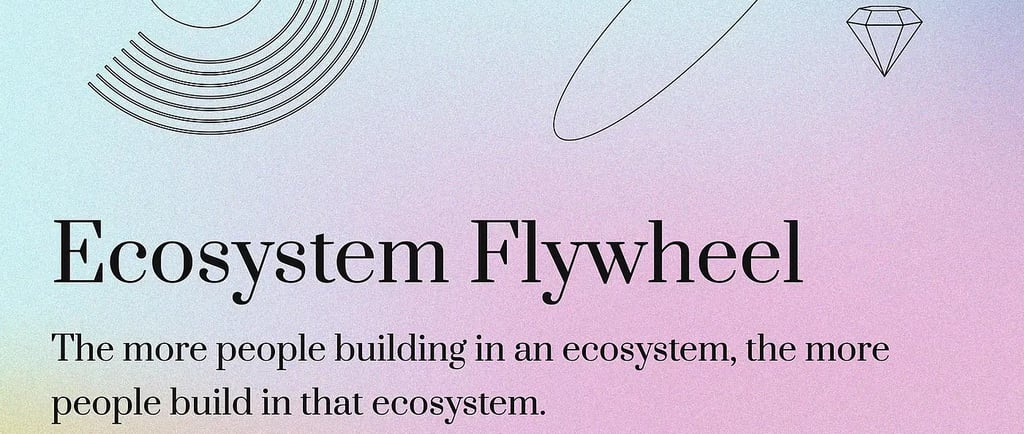Ecosystem Flywheel through Builders’ Education


Hey blockchain star, feeling a bit left in the shadow of Ethereum, Polygon, and Bitcoin’s disco lights? Do you often see yourself like the wallflower at the Web3 prom, while others are taking the dance floor’s attention?
Fear no more! If you’re looking for strategies to keep the house clean and tidy while having hordes of builders and big-money enterprises knock on your door, you’re in the right place. Every month, I write articles on professionalizing blockchain business development and operations, helping businesses like yours succeed.
Today, I’m writing about the importance of educating our builders and how this is a critical element in growing blockchain ecosystems. My friend, Vladimir Ponimajushij, from Posthuman Cosmos Validator, highlighted the importance of this topic, so, here are my thoughts on it, drawn from my work and interactions with the experts behind Ethereum, Cosmos, Polkadot, Cardano, and others.
What Does Builders Education Mean?
Builders education in blockchain ecosystems means offering support to builders to fully harness your platform’s technical capabilities, while simultaneously helping them establish healthy and thriving businesses around it. It goes beyond just detailed tech guides and a supportive community. It’s also about guiding them in crafting solid business plans, mastering customer acquisition, streamlining hiring, forging impactful partnerships, and expanding their business network. All of this aims to ensure builders not only join the ecosystem but also build profitable businesses on top of it.
Why is Builders Education So Important?
Because it’s one of the critical elements of the ecosystem growth flywheel. Builders engagement is an early and leading indicator of value creation in emerging blockchain platforms, and this is bolstered through robust educational resources and knowledge empowerment.
Builders create killer apps and drive protocol innovation. This delivers value to end users, attracting more customers, which in turn draws more total value locked (TVL), investors, other builders, and so on. You get the idea.
Ecosystem Flywheel Framework through Builders Education
While each protocol is unique with its strengths and weaknesses, there are some industry best practices that anyone can incorporate into their growth strategy and experiment with:
1. Have Comprehensive Docs
Distinguish Your Protocol: Offer presentations on your protocol’s technical and business advantages. Help your builders understand the specifics of your protocol’s capabilities. For a best-in-class, user-friendly example, check out Polygon’s website.
Tech Stack 101: Provide high-level and in-depth technical documentation of the available tech stack and tools. Practical zero-to-one examples and “how-to” guides on integrating decentralized apps with wallets, exchanges, and other platforms are invaluable. Have a look at Consensys MetaMask or OpenZeppelin documentation to get some inspiration.
In-depth Training Platforms: Consider bootcamps akin to Ethereum Developer Bootcamp by Alchemy or Interchain Developer Academy by B9 Lab. Certifications can be an added incentive for participation. For breaking down complex topics and offering step-by-step video tutorials, YouTube is often the go-to.
Build and Maintain a Roadmap: Much like Ethereum’s transparent roadmap, showing the direction and pace of your protocol helps build trust with your builders.
2. Offer great support
DevX and Developer Tools: Hire DevRels to provide support to your builders, and capture and direct their feedback to the protocol team. Equip the builders with tooling and testnets that let them experiment, much like how the Cosmos ecosystem does with tools like CosmWasm and Cosmology. Have a clear process for people to raise GitHub issues, report bugs, or contribute to your protocol repo.
24/7 Support: Key, especially during the onboarding phase, is offering technical support to your builders. Platforms like Discord and Telegram facilitate quick queries, while a StackOverflow-like platform can address protocol-specific Q&As.
3. Make the onboarding seamless
The onboarding experience: Teams specializing in integration and onboarding can be invaluable. They can facilitate a smoother transition for builders and assist in connecting with key partners and vetted service providers. See how Cosmos manages this through its Builders Program.
Who’s Who?: Regular community calls, listings of validators, miners, guardians, relayers, and introductions to core teams, founders, key devrels, community managers, influencers, and other ecosystem stakeholders are crucial. It aids builders in understanding the technical community, onboarding, networking, and knowing who to approach for help.
Community Events: Sponsor, organize, and champion social events, from meetups and hackathons to conferences. These are prime opportunities to build relationships, discover what teams are creating within the ecosystem, and establish strong bonds. EthCC is one of the most renowned blockchain event series, but other ecosystems like Solana, Cardano, Polkadot, and Cosmos also have notable events.
4. Provide business development guidance
Train Builders on Business Development: Generate resources on tokenomics, product development, marketing strategies, and more (e.g., Crypto Startups School from A16z). Cultivate accelerator and mentorship programs and hold demo days (like Y Combinator’s Demo Day). This gives your builders a platform to showcase innovations, receive feedback, and engage with the community. Some protocols even have internal business development teams that work side-by-side with builders to enact their go-to-market strategies.
Enable Builders to Access Funding: Especially for early-stage startups in bear markets, raising funds can be critical to iterate towards product-market fit. Here, guiding your builders on funding options and assisting with introductions and matchmaking is vital.
Teach Builders How to Scale: In the beginning, founders often bootstrap their ventures, striving to develop, launch, and promote the right product swiftly. They keep operations lean, usually handling this work on top of their full-time product roles. While this approach works in the early stages, it often becomes a hindrance during scaling. Educate your builders on project management, enhancing customer experience, due diligence, legal matters, hiring, treasury management, and more.
Spotlight Success Stories: Feature projects built on your protocol to showcase its full capabilities and demonstrate the path to product-market fit. For instance, see how Polygon celebrates its builders, simultaneously aiding them in gaining more brand awareness and validation.
In Summary
Spinning the ecosystem growth flywheel requires a well-backed strategy, centered on increasing builder engagement through education, tools, resources, and funding. Professionalizing business development and operations is becoming ever more essential, as bear markets reward ecosystems that think and act strategically and deploy their resources wisely and efficiently.
